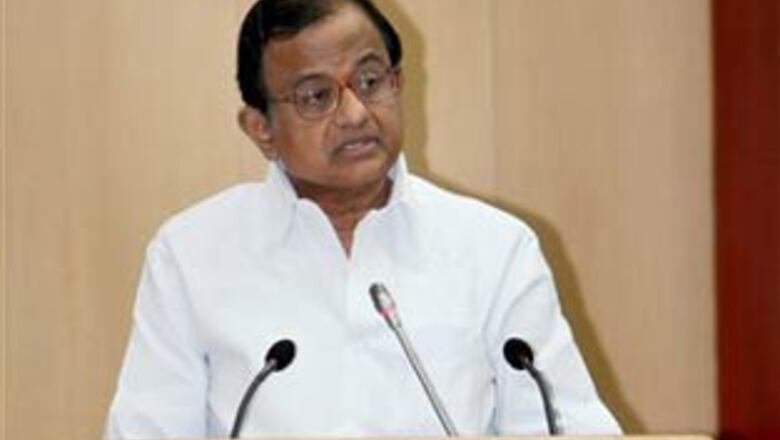
views
New Delhi: The 26/11 Mumbai terror strikes were a "game-changer", Home Minister P Chidambaram said on Monday while stressing that Pakistan-based groups like the Lashker-e-Taiba (LeT) and Jaish-e-Mohammed (JeM) persisted in their attempts to attack India.
"The attacks in Mumbai on 26 November 2008 were a game-changer. We can no longer afford to do business as usual. Policing in India was always a challenge; after 26/11, the challenge has become more grave," Chidambaram said while inaugurating a three-day conference of state police chiefs.
Fresh from his five-day trip to the US, Chidambaram echoed what Prime Minister Manmohan Singh pointed out a month back at an internal security conclave and said cross border terrorism was still a matter of deep concern.
Talking tough, Chidambaram there would be a "zero tolerance" to terror.
"On terrorism, our stance is zero tolerance. We shall raise our level of preparedness to fight any terror threat or terror attack and, in the case of a threat or attack, our response will be swift and decisive."
"Terrorist groups including LeT and JeM persist in their endeavour to launch terror attacks. They continue to innovate new ways and means of deniability," Chidambaram said.
"They find support among disgruntled elements within India. Cells and modules within India lend an Indian character to these activities."
He said security agencies were able to bust 12 terrorist modules in 2008 and, in the first half of the current year, almost 13 modules had been neutralised.
Speaking on left wing extremism that had their pockets of influence in 20 states, Chidambaram said there was no place for an armed liberation struggle in a republican democracy.
"We urge the left wing extremists to abjure violence and talk to the governments concerned on any issue, especially development, that affects the people," he said.
The home minister warned that the Communist Party of India-Maoist (CPI-Maoist) remained the most potent Naxal (Maoist) group with a presence in 17 states and a 90 percent share in violence and was determined to expand its activities into newer areas.
"The CPI-Maoist has also improved upon its military wares and operational tactics. Besides targeting the police, alleged police informers and so-called class enemies, it is laying greater emphasis on attacking economic and development infrastructure such as roads, bridges, railways, power and telecommunication networks," he said.
The outfit, he said, was seeking to expand its network by seeking alliances with secessionist and terrorist elements in the country.
"It has been keenly seeking ideological resonance and tactical understanding with the northeast insurgents and has begun to lend support to their secessionist ideology and demands."
Endemic insurgencies in the northeast were another security challenge before the country, he added.
On Jammu and Kashmir (J&K), Chidambaram said there was a steady improvement in the security scenario in the state but warned against complacency.
"There are attempts from across the border to forge unity among the separatists and escalate violence. The J&K police and security forces operating in the state must not lower their guard in the backdrop of recent improvement in the situation and be ever vigilant against likely attempts to step up violence," he said.
Police officers being reduced to footballs
Coming down heavily on state police chiefs for arbitrarily transferring senior officers, Chidambaram said on Monday that many police personnel had been reduced to footballs, being kicked from one post to the other.
"It is a matter of deep regret that many police officers have been reduced to a football, to be kicked here and there, from one post to another, without regard to the damage done to the job as well as the officer," Chidambaram said in his opening remarks at the three-day conference of state police chiefs.
State governments also drew flak from Chidambaram for their callous mindset towards security issues, reflected in the non-transparent recruitment procedures and ad-hoc transfer of police officers.
"I ask you to search your hearts and answer the question, what is the average length of tenure of a district superintendent of police? What is the average length of tenure of a station house officer? Why do you remain silent when arbitrary postings and transfers are made by the state government," Chidambaram queried.
State governments, he said, had been unwilling to revamp their recruitment procedure to make it time bound and increase transparency.
"Is it not your duty, as the head of the state police, to raise your voice not only on behalf of your officers but also on behalf of the people that you are duty bound to protect? As one famous judge said, 'When there is a duty to speak, silence is culpable'."
Another area of concern Chidambaram highlighted was the issue of funds. Urging state governments to grant "adequate funds" to the police, he said states generally give residual money, after allocation for other schemes, to the police.
"Given the constitutional responsibility, state governments must provide adequate funds for the state police. In fact, security of the state must be the first charge on the state exchequer. However, I find that many states take the exact opposite route and allot only the residue -- after providing for other plan and non-plan schemes -- to the head of 'police'."












Comments
0 comment